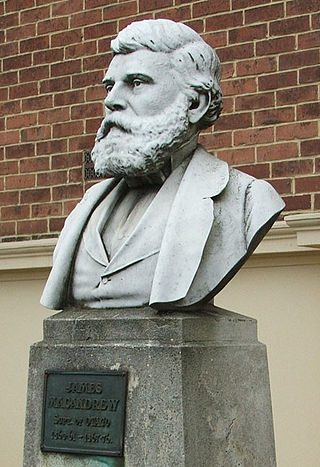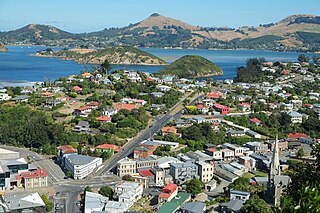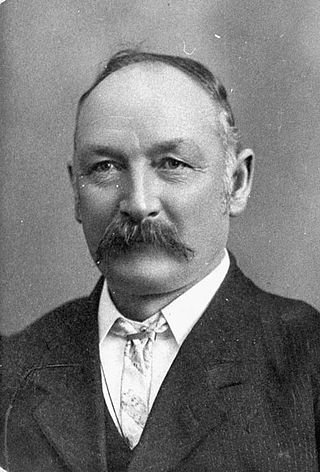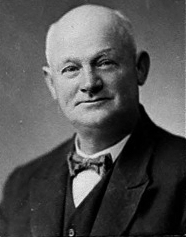Related Research Articles

James Macandrew was a New Zealand ship-owner and politician. He served as a Member of Parliament from 1853 to 1887 and as the last Superintendent of Otago Province.

Port Chalmers is a town serving as the main port of the city of Dunedin, New Zealand. Port Chalmers lies ten kilometres inside Otago Harbour, some 15 kilometres northeast of Dunedin's city centre.

The 1887 New Zealand general election was held on 26 September to elect 95 MPs to the tenth session of the New Zealand Parliament. The Māori vote was held on 7 September. 175,410 votes were cast. In 5 seats there was only one candidate.

John Andrew Millar was a New Zealand politician of the Liberal Party from Otago.

Dunedin North is a former New Zealand parliamentary electorate, which returned one Member of Parliament (MP) to the New Zealand House of Representatives. It was established for the 1905 election and has existed since. It was last held by David Clark of the New Zealand Labour Party, who replaced the long-standing representative Pete Hodgson. It was considered a safe Labour seat, with Labour holding the seat for all but one term (1975–1978) since 1928. In the 2020 electoral boundary review, Otago Peninsula was added to the area to address a population quota shortfall; with this change the electorate was succeeded by the Dunedin electorate in the 2020 election.

Sir James Mills was a New Zealand businessman and politician. He founded the Union Steam Ship Company in Dunedin in 1875.

Thomas Dick was a 19th-century New Zealand politician. Originally a merchant, he worked in London and then represented his firm on Saint Helena for seven years. From there, he was sent to Dunedin as the company's representative; he emigrated with an extended family. He soon became involved in politics and was Superintendent of Otago Province from 1865 until 1867. Over a period of 24 years, he represented various Dunedin electorates in Parliament and was Colonial Secretary (1880–1884), Minister of Justice from 1881 to 1882, and Minister of Education from 1881 to 1884. A deeply religious man, he was involved in many church affairs. He was one of the founders of Hanover Street Baptist Church; the building is now classified as Category I by Heritage New Zealand.
Clutha was a New Zealand parliamentary electorate from 1866 to 1996.
Lyttelton is a former New Zealand parliamentary electorate. It existed from 1853 to 1890, and again from 1893 to 1996, when it was replaced by the Banks Peninsula electorate.
Newton was a 19th-century parliamentary electorate in Auckland, New Zealand. It existed from 1861 to 1893 and was represented by seven Members of Parliament.
Chalmers, originally Port Chalmers, was a parliamentary electorate in the Otago Region of New Zealand, from 1866 to 1938 with a break from 1896 to 1902. It was named after the town of Port Chalmers, the main port of Dunedin and Otago.
Waikouaiti was a parliamentary electorate in the Otago region of New Zealand, from 1866 to 1908.

Archibald Campbell was a New Zealand politician of the Labour Party and Secretary of the Port Chalmers Waterside Workers Union.

William Hunter Reynolds was a 19th-century businessman and Member of Parliament in Dunedin, Otago region, New Zealand. He was a cabinet minister. He is the only person who held membership on the Otago Provincial Council over the entire course of its existence (1853–1876), was Speaker of the council for three years, and was a member of the council's executive eight times.

Michael Connelly was a New Zealand trade unionist, politician of the Labour Party, and a Member of the Legislative Council from 1936 to 1950.
Heathcote was a 19th-century parliamentary electorate in Christchurch, New Zealand.
Dunedin and Suburbs South was a parliamentary electorate in the city of Dunedin in Otago, New Zealand from 1862 to 1866. From 1863 it was a multi-member electorate.

Edmund Giblett Allen (1844–1909) was a Liberal Party Member of Parliament in New Zealand.
The 1866 Port Chalmers by-election was a by-election held on 15 December 1866 during the 4th New Zealand Parliament in the Otago electorate of Port Chalmers.
The 1878 Port Chalmers by-election was a by-election held on 12 April 1878 in the Port Chalmers electorate during the 6th New Zealand Parliament.
References
- ↑ "The Port Chalmers Seat". Thames Advertiser. 18 March 1887.
- ↑ "The Port Chalmers Seat". The New Zealand Times. 7 April 1887.